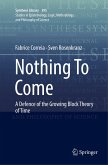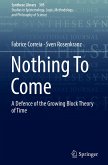Introduction to Formal Philosophy
Herausgegeben:Hansson, Sven Ove; Hendricks, Vincent F.;Mitarbeit:Michelsen Kjeldahl, Esther
Introduction to Formal Philosophy
Herausgegeben:Hansson, Sven Ove; Hendricks, Vincent F.;Mitarbeit:Michelsen Kjeldahl, Esther
- Gebundenes Buch
- Merkliste
- Auf die Merkliste
- Bewerten Bewerten
- Teilen
- Produkt teilen
- Produkterinnerung
- Produkterinnerung
This Undergraduate Textbook introduces key methods and examines the major areas of philosophy in which formal methods play pivotal roles. Coverage begins with a thorough introduction to formalization and to the advantages and pitfalls of formal methods in philosophy. The ensuing chapters show how to use formal methods in a wide range of areas.
Throughout, the contributors clarify the relationships and interdependencies between formal and informal notions and constructions. Their main focus is to show how formal treatments of philosophical problems may help us understand them better. Formal…mehr
Andere Kunden interessierten sich auch für
![Introduction to Formal Philosophy Introduction to Formal Philosophy]() Introduction to Formal Philosophy61,99 €
Introduction to Formal Philosophy61,99 €![Nothing To Come Nothing To Come]() Fabrice CorreiaNothing To Come82,99 €
Fabrice CorreiaNothing To Come82,99 €![Nothing To Come Nothing To Come]() Fabrice CorreiaNothing To Come82,99 €
Fabrice CorreiaNothing To Come82,99 €![Ludwig Wittgenstein's Philosophical Investigations Ludwig Wittgenstein's Philosophical Investigations]() Joseph AgassiLudwig Wittgenstein's Philosophical Investigations64,99 €
Joseph AgassiLudwig Wittgenstein's Philosophical Investigations64,99 €![Gödel, Escher, Bach Gödel, Escher, Bach]() Douglas R. HofstadterGödel, Escher, Bach37,93 €
Douglas R. HofstadterGödel, Escher, Bach37,93 €![Animal Ethics and the Autonomous Animal Self Animal Ethics and the Autonomous Animal Self]() Natalie ThomasAnimal Ethics and the Autonomous Animal Self104,99 €
Natalie ThomasAnimal Ethics and the Autonomous Animal Self104,99 €![Patientenautonomie und informierte Einwilligung Patientenautonomie und informierte Einwilligung]() Pia BeckerPatientenautonomie und informierte Einwilligung69,99 €
Pia BeckerPatientenautonomie und informierte Einwilligung69,99 €-
-
-
This Undergraduate Textbook introduces key methods and examines the major areas of philosophy in which formal methods play pivotal roles. Coverage begins with a thorough introduction to formalization and to the advantages and pitfalls of formal methods in philosophy. The ensuing chapters show how to use formal methods in a wide range of areas.
Throughout, the contributors clarify the relationships and interdependencies between formal and informal notions and constructions. Their main focus is to show how formal treatments of philosophical problems may help us understand them better. Formal methods can be used to solve problems but also to express new philosophical problems that would never have seen the light of day without the expressive power of the formal apparatus.
Formal philosophy merges work in different areas of philosophy as well as logic, mathematics, computer science, linguistics, physics, psychology, biology, economics, political theory, and sociology. This title offers an accessible introduction to this new interdisciplinary research area to a wide academic audience.
Throughout, the contributors clarify the relationships and interdependencies between formal and informal notions and constructions. Their main focus is to show how formal treatments of philosophical problems may help us understand them better. Formal methods can be used to solve problems but also to express new philosophical problems that would never have seen the light of day without the expressive power of the formal apparatus.
Formal philosophy merges work in different areas of philosophy as well as logic, mathematics, computer science, linguistics, physics, psychology, biology, economics, political theory, and sociology. This title offers an accessible introduction to this new interdisciplinary research area to a wide academic audience.
Produktdetails
- Produktdetails
- Springer Undergraduate Texts in Philosophy
- Verlag: Springer / Springer International Publishing / Springer, Berlin
- Artikelnr. des Verlages: 978-3-319-77433-6
- 1st edition 2018
- Seitenzahl: 756
- Erscheinungstermin: 8. November 2018
- Englisch
- Abmessung: 241mm x 160mm x 46mm
- Gewicht: 1298g
- ISBN-13: 9783319774336
- ISBN-10: 3319774336
- Artikelnr.: 50904825
- Herstellerkennzeichnung Die Herstellerinformationen sind derzeit nicht verfügbar.
- Springer Undergraduate Texts in Philosophy
- Verlag: Springer / Springer International Publishing / Springer, Berlin
- Artikelnr. des Verlages: 978-3-319-77433-6
- 1st edition 2018
- Seitenzahl: 756
- Erscheinungstermin: 8. November 2018
- Englisch
- Abmessung: 241mm x 160mm x 46mm
- Gewicht: 1298g
- ISBN-13: 9783319774336
- ISBN-10: 3319774336
- Artikelnr.: 50904825
- Herstellerkennzeichnung Die Herstellerinformationen sind derzeit nicht verfügbar.
Sven Ove Hansson is professor in philosophy at the Department of Philosophy and History, Royal Institute of Technology, Stockholm. He is editor-in-chief of Theoria and of the two book series Outstanding Contributions to Logic and Philosophy, Technology and Society. He is the author of more than 350 articles in international refereed journals and books, in research areas including logic, philosophy of science and technology, epistemology, value theory, philosophy of risk, fundamental and applied moral theory, and political philosophy. His recent books include The Ethics of Risk (2013), David Makinson on Classical Methods for Non-Classical Problems (2014, edited), Norms in Technology (2013, edited with Marc J. de Vries and Anthonie W.M. Meijers), The Role of Technology in Science: Philosophical Perspectives (2015, edited), The Argumentative Turn in Policy Analysis. Reasoning about Uncertainty (2016, edited with Gertrude Hirsch Hadorn, 2016), The Ethics of Technology. Methods and approaches (2017, edited), Descriptor Revision. Belief change through direct choice (2018) and Belief Change. Introduction and Overview (with Eduardo Fermé, in press). He is member of the Royal Swedish Academy of Engineering Sciences (IVA) and past president of the Society for Philosophy and Technology. Vincent F. Hendricks is professor of formal philosophy at The University of Copenhagen. He is director of the Center for Information and Bubble Studies (CIBS) sponsored by the Carlsberg Foundation. Hendricks has been awarded a number of national and international prizes for his research in formal epistemology, methodology, logic, information theory, social psychology and bubble studies, among them the Elite Research Prize by the Danish Ministry of Science, Technology and Innovation, the Roskilde Festival Elite Research Prize, The Rosenkjær Prize by the Danish Broadcasting Company, and the ChoiceMagazine Outstanding Title Award. He was editor-in-chief of Synthese: An International Journal for Epistemology, Methodology and Philosophy of Science between 2005 and 2015.
Part I: The scope and methods of formal philosophy.- Chapter 1. Formalization (Sven Ove Hansson).- Part II: Reasoning and inference.- Chapter 2. Non-monotonic reasoning (Alex Bochman).- Chapter 3. Argument (Henry Prakken).- Chapter 4. Induction (Rafal Urbaniak and Diderik Batens).- Chapter 5. Bivalence and future contingency (François Rivenc, Carlo Proietti, and Gabriel Sandu).- Chapter 6. Conditionals (John Cantwell).- Chapter 7. Neural network models for conditionals (Hannes Leitgeb).- Chapter 8. Proof theory (Jeremy Avigad).- Chapter 9. Formal methods and the history of philosophy (Catarina Dutilh Novaes).- Part III: Metaphysics and philosophy of language.- Chapter 10. Theory of concepts (Erich Rast).- Chapter 11. Categories (Jean-Pierre Marquis).- Chapter 12. Necessity and possibility (Melvin Fitting).- Chapter 13. Reference and denotation (Robert van Rooy).- Chapter 14. Indexicals (Philippe Schlenker).- Chapter 14. Can natural language be captured in a formal system? (MartinStokhof).- Part IV: Epistemology.- Chapter 15. Knowledge representation for philosophers (Richmond H. Thomason).- Chapter 16. Epistemic logic and epistemology (Wesley H. Holliday).- Chapter 16. Belief change (Sven Ove Hansson).- Chapter 17. Coherence (Sven Ove Hansson).- Chapter 18. Probability theory (Darrell P. Rowbottom).- Chapter 19. Bayesian epistemology (Erik J. Olsson). Part V: Philosophy of science.- Chapter 20. Models of the development of scientific theories (Gerhard Schurz).- Chapter 21. Computational models in science and philosophy (Paul Thagard).- Chapter 22. Space and time (John Manchak).- Chapter 23. A formal theory of causation (Richard Scheines).- Part VI: Axiology and moral philosophy.- Chapter 24. Formal investigations of value (Sven Ove Hansson).- Chapter 25. Value theory (axiology) (Erik Carlson).- Chapter 26. Preference and choice (Sven Ove Hansson).- Chapter 27. Preference Change (Fenrong Liu).- Deontic logic (Sven Ove Hansson).- Chapter 28. Action theories, Andreas Herzig (Emiliano Lorini, and Nicolas Troquard).- Part VII: Decision theory and social philosophy.- Chapter 29. Decision theory: A formal philosophical introduction (Richard Bradley).- Chapter 30. Bayesian decision theory (Jeffrey Helzner).- Chapter 31. Representing uncertainty (Sven Ove Hansson).- Money-pumps (Sven Ove Hansson).- Chapter 32. Causal decision theory (Brad Armendt).- Dynamic decision theory (Katie Steele).- Chapter 33. Logical approaches to law (John Woods).- Chapter 34. Judgement aggregation (Philippe Mongin).- Chapter 35. Social choice and voting (Prasanta K. Pattanaik).
Part I: The scope and methods of formal philosophy.- Chapter 1. Formalization (Sven Ove Hansson).- Part II: Reasoning and inference.- Chapter 2. Non-monotonic reasoning (Alex Bochman).- Chapter 3. Argument (Henry Prakken).- Chapter 4. Induction (Rafal Urbaniak and Diderik Batens).- Chapter 5. Bivalence and future contingency (François Rivenc, Carlo Proietti, and Gabriel Sandu).- Chapter 6. Conditionals (John Cantwell).- Chapter 7. Neural network models for conditionals (Hannes Leitgeb).- Chapter 8. Proof theory (Jeremy Avigad).- Chapter 9. Formal methods and the history of philosophy (Catarina Dutilh Novaes).- Part III: Metaphysics and philosophy of language.- Chapter 10. Theory of concepts (Erich Rast).- Chapter 11. Categories (Jean-Pierre Marquis).- Chapter 12. Necessity and possibility (Melvin Fitting).- Chapter 13. Reference and denotation (Robert van Rooy).- Chapter 14. Indexicals (Philippe Schlenker).- Chapter 14. Can natural language be captured in a formal system? (MartinStokhof).- Part IV: Epistemology.- Chapter 15. Knowledge representation for philosophers (Richmond H. Thomason).- Chapter 16. Epistemic logic and epistemology (Wesley H. Holliday).- Chapter 16. Belief change (Sven Ove Hansson).- Chapter 17. Coherence (Sven Ove Hansson).- Chapter 18. Probability theory (Darrell P. Rowbottom).- Chapter 19. Bayesian epistemology (Erik J. Olsson). Part V: Philosophy of science.- Chapter 20. Models of the development of scientific theories (Gerhard Schurz).- Chapter 21. Computational models in science and philosophy (Paul Thagard).- Chapter 22. Space and time (John Manchak).- Chapter 23. A formal theory of causation (Richard Scheines).- Part VI: Axiology and moral philosophy.- Chapter 24. Formal investigations of value (Sven Ove Hansson).- Chapter 25. Value theory (axiology) (Erik Carlson).- Chapter 26. Preference and choice (Sven Ove Hansson).- Chapter 27. Preference Change (Fenrong Liu).- Deontic logic (Sven Ove Hansson).- Chapter 28. Action theories, Andreas Herzig (Emiliano Lorini, and Nicolas Troquard).- Part VII: Decision theory and social philosophy.- Chapter 29. Decision theory: A formal philosophical introduction (Richard Bradley).- Chapter 30. Bayesian decision theory (Jeffrey Helzner).- Chapter 31. Representing uncertainty (Sven Ove Hansson).- Money-pumps (Sven Ove Hansson).- Chapter 32. Causal decision theory (Brad Armendt).- Dynamic decision theory (Katie Steele).- Chapter 33. Logical approaches to law (John Woods).- Chapter 34. Judgement aggregation (Philippe Mongin).- Chapter 35. Social choice and voting (Prasanta K. Pattanaik).








